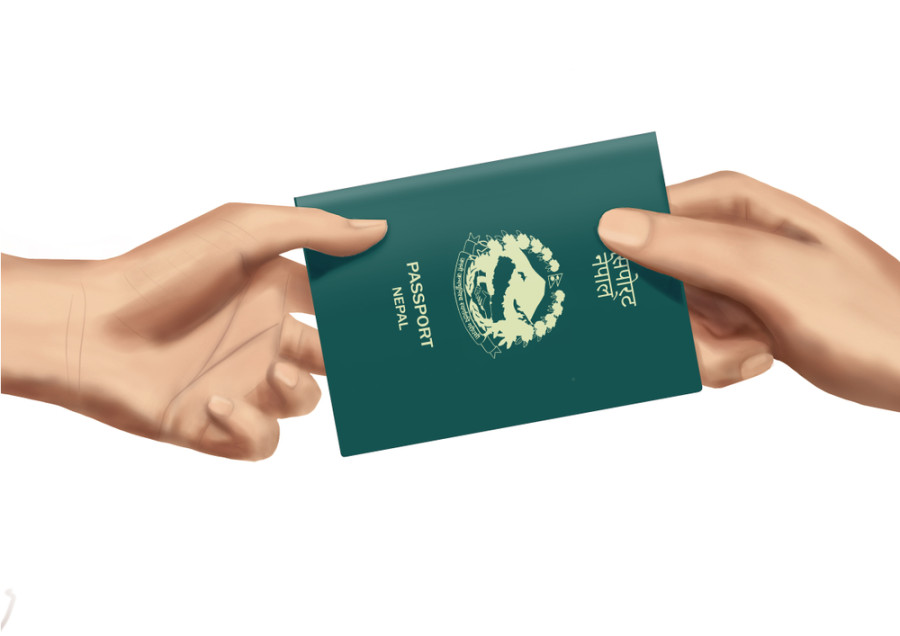National
Foreign Employment Department tells recruiting agencies not to hold passports
In a new circular, the department asks prospective workers not to submit their passports to agencies until their jobs are finalised and pay recruiters only through their bank accounts.
Chandan Kumar Mandal
Last week, two men in their early 20s visited Kathmandu looking for jobs abroad. The duo from Mahottari, one of the country’s top five source districts for migrant workers, were promised jobs in Qatar.
“The agent took us to a recruiting agency for an interview,” said P., who wanted to be identified by his initials fearing that revealing his identity would affect his relationship with the agent. “As soon as we reached the recruiting agency, he asked us for our passports. We refused to give him our passport, but he insisted.”
Every year, tens of thousands of youths come to Kathmandu, often after being lured by sub-agents, who promise them jobs abroad through recruiting agencies. These workers end up handing over their passports to the sub-agents or recruiting agencies even if they are reluctant to do so.
“Most of the time, aspiring migrant workers look for jobs with the help of sub-agents, who are either their relatives or acquaintances,” said Swarna Kumar Jha, a labour migration expert. “These workers are made to believe the passport will not be misused. They are also made to believe that job search can’t go on if without the passport.”
The Department of Foreign Employment, the central government body that oversees the labour migration sector, has now come up with a circular that strictly bars recruiting agencies from hoarding passports of migrant workers until they are selected for jobs.
“There is a tendency of recruiting agencies and sub-agents to collect passports from migrants who apply for jobs and hold them for a long time,” Tikamani Neupane, spokesperson for the department, told the Post.
“The department is strictly going to implement this. We urge migrant workers to submit their passports only after they are selected through a job interview. Also, we ask recruiting agencies to take scanned copies of passports only.”
According to Neupane, foreign employment rules do not require workers to submit their passports unless they are formally selected for the job they applied for.
“If any agency or agent holds the passports of workers, this is illegal,” said Neupane. “Such practices also deprive the workers of their free choice to seek opportunities wherever they want to.”
Around 90 percent of workers who wish to migrate for jobs abroad, do so through recruiting agencies in the country. Sub-agents who collect workers from villages and districts, bring them to Kathmandu and connect with Kathmandu-based foreign employment recruiting agencies.
During the selection process, which can sometimes go on for several months, workers submit their passports and have no other option but to wait for the recruiting agency to find them a job.
“While hoarding passports is illegal, it also works as a way to control migrant workers. The passport is like collateral. Once they hold the passports, they are in command and understand that the workers don’t have anywhere else to go,” said Jha. “The workers can’t bargain with the agency and are more likely to end up agreeing to the recruiting agencies’ terms and conditions.”
In other measures for keeping workers safe from possible exploitations, the department has asked migrant workers to deposit the amount they are supposed to pay to the agencies for their services to their bank account. Likewise, recruiting agencies are also asked to accept money through the banking channel only. The move was introduced to check agencies who often overcharge migrant workers for their services.
“Banking transactions can be useful in controlling fraud incidents related to collecting the hefty amount from migrant workers. The government policy is also there to make all the official transactions through the banking system,” said Neupane. “Even when the worker is charged beyond the government ceiling, and they deposit the whole amount to the bank account, it can give us strong evidence for taking action against such agencies.”
Despite the government’s free visa and free ticket policy, which has fixed Rs10,000 as a service charge for recruitment agencies, there have been instances of workers paying several times more than the government ceiling.
According to Jha, these new moves are welcome as they try to protect workers from exploitation at home and abroad.
“The transaction through banking rule will make the whole business between migrants and recruiting agencies transparent. Workers can be safe from theft at home,” said Jha. “However, it does not ensure that workers will not be cheated as they have been receiving receipts for only Rs 10,000 while the rest of the money is collected in cash. Only if it can be implemented effectively, workers can feel respite.”
The two workers from Mahottari did not submit their passports to the recruiting agencies as instructed by their sub-agents.
“We had barely known anything about the job. The sub-agents could not tell us about it in detail,” said D., another worker from Mahottari. “We smelled something fishy, so we returned without submitting our original passports. Let’s see when we hear back from them.”




 9.83°C Kathmandu
9.83°C Kathmandu














